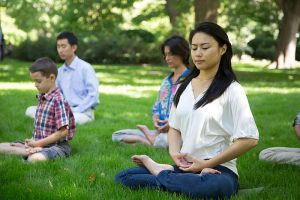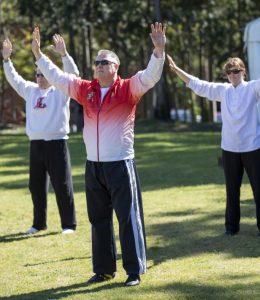Improve Health Outcomes in Women on Long-Term Sick Leave with Mindfulness
By John M. de Castro, Ph.D.
“Since stress compromises our immune system, becoming caught up in this way can slow down our recovery. Instead, aim to approach your illness with care, seeing things as they are, with acceptance and compassion.” — Mark Bertin
Chronic Pain and mental health issues are the most common causes of long-term sick leave. At least 100 million adult Americans have chronic pain conditions. The most common treatment for chronic pain is drugs. These include over-the-counter analgesics and opioids. But opioids are dangerous and highly addictive. So, there is a great need to find safe and effective ways to lower the psychological distress and improve the individual’s ability to cope with the pain. There is an accumulating volume of research findings that demonstrate that mindfulness practices, in general, are effective in treating pain.
Depression affects over 6% of the population. Depression can be difficult to treat. It is usually treated with antidepressant medication. But, of patients treated initially with drugs only about a third attained remission of the depression. Even after remission there are a number of symptoms that remain. These include lingering dysphoria, impaired psychosocial functioning, fatigue, and decreased ability to work. These residual symptoms can lead to relapse. Mindfulness training is also an alternative treatment for depression. It has been shown to be an effective treatment for depression and its recurrence and even in the cases where drugs fail.
Anxiety disorders are the most common mental illness in the United States, affecting 40 million adults, or 18% of the population. A characterizing feature of anxiety disorders is that the suffer overly identifies with and personalizes their thoughts. The sufferer has recurring thoughts, such as impending disaster, that they may realize are unreasonable, but are unable to shake. Anxiety disorders have generally been treated with drugs. But there are considerable side effects, and these drugs are often abused. Recently, it has been found that mindfulness training can be effective for anxiety disorders.
A therapeutic technique that contains mindfulness training and Cognitive Behavioral Therapy (CBT) is Acceptance and Commitment Therapy (ACT). It focuses on the individual’s thoughts, feelings, and behavior and how they interact to impact their psychological and physical well-being. It then works to change thinking to alter the interaction and produce greater life satisfaction. ACT employs mindfulness practices to increase awareness and develop an attitude of acceptance and compassion in the presence of painful thoughts and feelings. ACT teaches individuals to “just notice”, accept and embrace private experiences and focus on behavioral responses that produce more desirable outcomes. This suggests that ACT may be an effective treatment for women who are on long-term sick leave.
In today’s Research News article “Comparing the Efficacy of Multidisciplinary Assessment and Treatment, or Acceptance and Commitment Therapy, with Treatment as Usual on Health Outcomes in Women on Long-Term Sick Leave-A Randomised Controlled Trial.” (See summary below or view the full text of the study at: https://www.ncbi.nlm.nih.gov/pmc/articles/PMC7916944/ ) Finnes and colleagues recruited working age women who were on long-term sick leave and randomly assigned them to receive either treatment as usual, Acceptance and Commitment Therapy (ACT), or ACT in combination with a multidisciplinary team consisting of a physician, a psychologist, an occupational therapist and a social worker. They were measured before and after treatment and at 6 and 12 months after treatment for sick leave, satisfaction with treatment, pain, anxiety, depression, satisfaction with life, and general health well-being.
They found that there were no significant differences between Acceptance and Commitment Therapy (ACT), or ACT plus team with the women’s satisfaction with treatment. But in comparison to baseline and the treatment as usual group, both treatments produced significant reductions in anxiety, depression, pain intensity and significant increases in satisfaction with life, and general health well-being. At one year after treatment the ACT plus team group had significantly more patients classified as recovered than the ACT alone group.
These results demonstrate that Acceptance and Commitment Therapy (ACT) is effective in treating the physical and psychological symptoms of women who were on long-term sick leave. Women on long-term sick leave are very difficult to treat as their issues have resisted improvement for a substantial period of time. So, the ability of ACT to improve these symptoms is impressive. Adding the team produced slightly better outcomes at 12 months but the additional cost of the team is quite significant. So, from a cost effectiveness standpoint, ACT alone is superior.
So, improve health outcomes in women on long-term sick leave with mindfulness.
“Musculoskeletal pain, depression, and anxiety cause the majority of all sick leave. . . Interestingly enough, mindfulness has become an important construct in return-to-work rehabilitation.” – Emily Lipinski
CMCS – Center for Mindfulness and Contemplative Studies
This and other Contemplative Studies posts are also available on Google+ https://plus.google.com/106784388191201299496/posts and on Twitter @MindfulResearch
Study Summary
Finnes, A., Anderzén, I., Pingel, R., Dahl, J., Molin, L., & Lytsy, P. (2021). Comparing the Efficacy of Multidisciplinary Assessment and Treatment, or Acceptance and Commitment Therapy, with Treatment as Usual on Health Outcomes in Women on Long-Term Sick Leave-A Randomised Controlled Trial. International journal of environmental research and public health, 18(4), 1754. https://doi.org/10.3390/ijerph18041754
Abstract
Background: Chronic pain and mental disorders are common reasons for long term sick leave. The study objective was to evaluate the efficacy of a multidisciplinary assessment and treatment program including acceptance and commitment therapy (TEAM) and stand-alone acceptance and commitment therapy (ACT), compared with treatment as usual (Control) on health outcomes in women on long-term sick leave. Method: Participants (n = 308), women of working age on long term sick leave due to musculoskeletal pain and/or common mental disorders, were randomized to TEAM (n = 102), ACT (n = 102) or Control (n = 104). Participants in the multidisciplinary assessment treatment program received ACT, but also medical assessment, occupational therapy and social counselling. The second intervention included ACT only. Health outcomes were assessed over 12 months using adjusted linear mixed models. The results showed significant interaction effects for both ACT and TEAM compared with Control in anxiety (ACT [p < 0.05]; TEAM [p < 0.001]), depression (ACT [p < 0.001]; TEAM [p < 0.001]) and general well-being (ACT [p < 0.05]; TEAM [p < 0.001]). For self-rated pain, there was a significant interaction effect in favour of ACT (p < 0.05), and for satisfaction with life in favour of TEAM (p < 0.001). Conclusion: Both ACT alone and multidisciplinary assessment and treatment including ACT were superior to treatment as usual in clinical outcomes.
https://www.ncbi.nlm.nih.gov/pmc/articles/PMC7916944/









